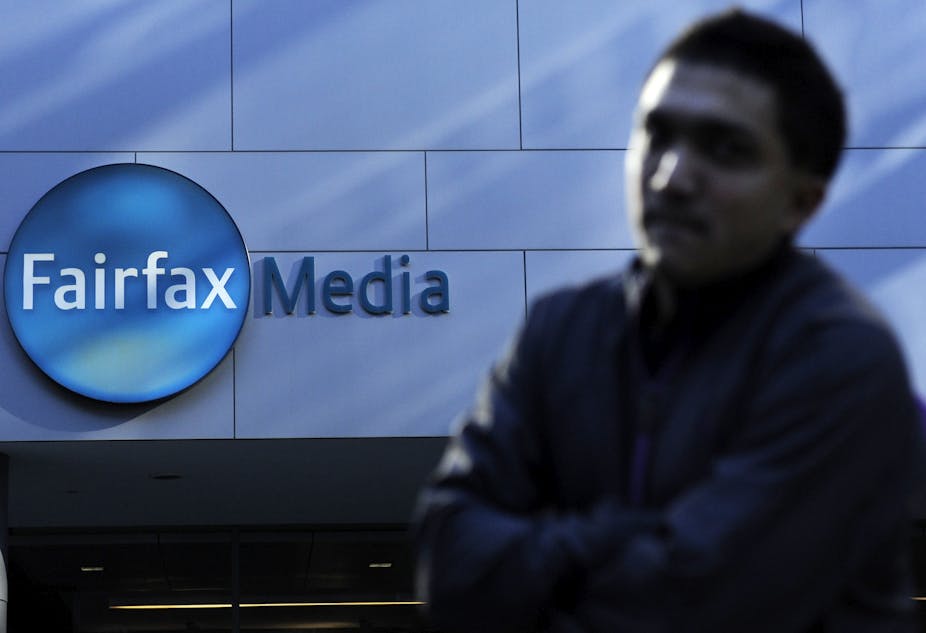Amid indications that Fairfax is going into the corporate death spiral – ongoing disinvestment resulting in smaller market share - we’re asking the wrong questions about the future of the Australian media.
Unsurprisingly, we’re getting the wrong answers. After the Finkelstein and Convergence reports – and talk of mechanisms such as privacy tort – it’s time to be brave. Time to confront the elephants under the media bed … and at the media board tables.
One elephant is trust in the media.
One reason that the commercial media are in crisis is that they’re in hock to skittish private equity and thus subject to the tyranny of the quarterly return. Another reason is that print and broadcast groups have abused consumer trust.
That abuse involves a decade of cuts that have slashed journalism in favour of infotainment: why read the SMH or The Age if they’re increasingly indistinguishable from tabloids? The same malaise is evident in broadcasting, where there is a dearth of original and engaging programming.
Producer Gerald Stone once asked: Who Killed Channel Nine? The answer is the accountants, investors and merchant bankers, not the iPad and Pirate Bay. If we’re not watching free to air TV it’s because broadcasting is simply boring rather than because we’ve been hypnotised by the web.
If we’re not reading broadsheets such as the Canberra Times is because they’re increasingly provincial, clones of weekly giveaways. Slashing jobs, and then slashing again, won’t change consumer disenchantment. In the absence of investment we can expect to see increasing reliance by elites on non-traditional sources such as The Conversation and a shift to the blinkered micro-audiences – the market of one rather than of many – that is antithetical to the conversations that are a foundation of a civil society.
Another elephant is the presence at media board tables of individuals whose interest in the media appears to centre on exerting influence. Those people, in contrast to families such as the Grahams (Washington Post) and Sulzbergers (New York Times), are unlikely to regard their investment as akin to a trusteeship on behalf of the community rather than a cash register or hotline to The Lodge.
Can we trust such proprietors, given the uncertain restraint provided by private equity representatives whose only interest is in an above-market return on investment and who respond to the jingle “information wants to be free” with the quip that “money just wants to be free-er, so be nice or we’ll take it away”?
Eighty years ago UK Prime Minister Stanley Baldwin warned of proprietors aiming at “power, and power without responsibility — the prerogative of the harlot through the ages”. We might ask whether that warning is relevant. Is there value for the consumer in daily infotorial from Citizen Rinehart or Lord Palmer?
Neither the ALP nor the Coalition at the national and state levels have been willing to be seen to stand up to figures such as Kerry Packer or Gina Rinehart. Regulators have taken a similarly laissez-faire stance in dealing with recurrent infractions by Alan Jones. As a society we are accordingly getting the media (and the politicians) that we deserve, the bland or blinkered talking at the blind.
If we want to engender trust in the media, the trust that would allow the organisations to retain their commercial advantage in the “age of citizen journalism”, we need on occasion to look under the bed. We also need to ask whether some people should be sitting at the table and underpin that questioning through effective anti-SLAPP legislation that is founded on a national Bill of Rights.
It is of concern that Australia’s richest woman, a person whose wealth is attributable to the vagaries of inheritance and mining licences rather than exemplary innovation, appears headed to control of one of the nation’s two dominant newspaper groups. She has a substantial stake in a broadcasting group.
She is embroiled in a venomous family dispute about a trust fund. That dispute raises questions about governance and about scrutiny of claims – which it is important to note have not been tested in court – of serious misbehaviour. Is it time to go beyond Finkelstein and bravely consider expectations about stewardship?
Paul Keating sought to encourage better behaviour among Australian media magnates and managers through a demarcation between print and broadcast. Convergence means that demarcation becomes less viable by the day. What we should insist on as a liberal democratic state is that major media organisations aspire to best practice in corporate governance and in responsible reporting.
The decision by Seven West Media to walk away from the Australian Press Council and blithely regulate itself raises questions about whether we can trust the entrepreneurs and their executives.
If lawyers are expected to be of good fame and character, what about the people in the board rooms and executive suites? Given the flimsiness of past charters of editorial independence – recall Murdoch’s disregard of that at the Times on the basis of ‘commercial necessity’, a necessity that won’t disappear just by installing a paywall – can we trust nervous journalists and even more nervous managers to rigorously examine the people at the top? If we don’t trust them, the death spiral will continue and we’ll all be poorer.

